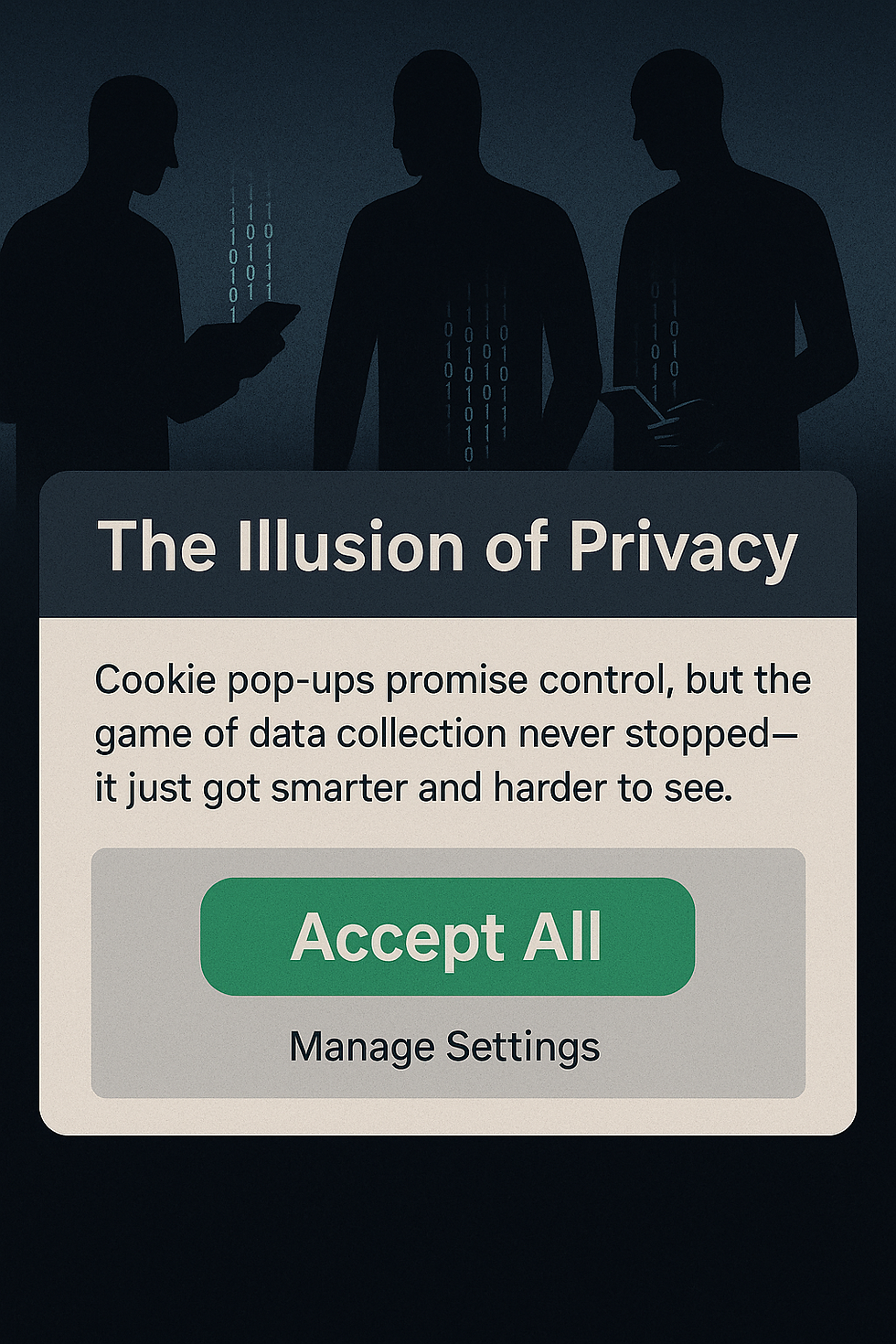The Privacy Lie: Why Your Data Was Never Really Yours
- Jefrey Gomez
- Aug 19, 2025
- 4 min read
I just clicked ‘Accept All’ on a cookie pop-up without reading a word of it. You probably did too. It's a reflex we perform dozens of times a week.
We do it despite knowing, deep down, that we’re agreeing to something we don’t understand. We see the banners referencing privacy rules like Singapore’s PDPA or Europe's GDPR, and we think we're being given a choice. But does anyone really feel like their privacy is protected?

This is the great lie of the modern internet. We've been given the illusion of control, while the game of data collection continues, faster and more cleverly than ever before.
The Game Hasn't Stopped, The Rules Just Changed
The fundamental truth is that a huge part of the digital economy is built on understanding people. Knowing what you like, where you go, and what you might buy next is the fuel for countless businesses. That hunger for information doesn't just disappear because a new law appears. Instead, the game adapts.
The methods are subtle and designed to work around the edges of the rules:
The Consent Charade: Those cookie banners are a perfect example. The bright green "Accept All" button is huge. The option to refuse is often hidden in a tiny grey link that leads to a maze of confusing toggles. It’s a masterclass in designing a choice where one path is effortless and the other is a chore.
The Data Brokers: These are the ghosts in the machine. Companies that silently gather scraps of information about you from thousands of sources—public records, app usage, competition entries—and package it all up for sale. You never interact with them directly, but they probably have a detailed file on you.
Device Fingerprinting: This is a more technical, and more unnerving, method. It’s like a detective identifying you not by your name, but by the unique scuff marks on your shoes, the way you hold your pen, and the brand of your watch. By combining dozens of technical details about your device (fonts, screen size, browser type), companies can create a unique "fingerprint" to track you without ever needing a cookie.
Shadow Profiles: Even if you’ve sworn off a certain social media platform, it might still have a file on you. These "shadow profiles" are built from the contact lists and photo tags uploaded by your friends. It’s a digital ghost of you, created from the data of others.
We've Seen This Movie Before (And We Keep Watching It)
The Cambridge Analytica scandal was supposed to be our big wake-up call. It was a shocking look behind the curtain at how easily personal data could be gathered and used for purposes we never imagined. It sparked global outrage and led to massive fines.
And yet, has the fundamental model really changed? Or have the methods just become more sophisticated? Data breaches and large-scale data scraping incidents, like the one involving LinkedIn, have become so common they barely make the news anymore. We’re reminded that even our "public" information can be harvested and used in ways we never intended.
The referees—the regulators—are struggling to keep up with the players. The global nature of the internet means data can flow through countries with weaker laws, and the sheer complexity of the ad-tech ecosystem makes it nearly impossible to track where your information truly goes.
So What Can You Actually Do?
This isn't about becoming a digital hermit. It's about being less naive and taking a few practical steps.
Use the Tools: Privacy-focused browsers like Brave, search engines like DuckDuckGo, and a good VPN can significantly reduce your digital footprint. They aren’t perfect, but they make you a much harder target.
Think Before You Share: Ask yourself if that quiz, app, or service really needs your date of birth or access to your contacts. Practice a healthy level of data scepticism.
Support the Good Guys: When a company is transparent about its data practices and gives you clear, simple controls, reward them with your business.
A Better Playbook for Businesses
For those of us in marketing, this isn't a legal lecture; it's a strategic conversation. In 2025, trust is a competitive advantage. Here's how to earn it:
Be Brutally Honest: Ditch the legal jargon in your privacy policies. Explain in plain English what you collect, why you collect it, and what you do with it. If you can’t explain it simply, you’re making it too complicated.
Collect What You Need, Not All You Can: The old mindset was to hoard as much data as possible. The smart mindset is to be a data minimalist. Only collect what is essential to provide your service. It reduces your risk and increases customer trust.
Aim for Smart, Not Spooky: The best marketing offers value without making people feel watched. Use contextual data (what a person is looking at right now) rather than chasing them around the web with behavioural data from last week.
The uncomfortable truth is that the "free" internet we enjoy is largely funded by this relentless appetite for data. Real privacy won't come from another law or a better pop-up. It will come when we, as consumers, demand better, and when businesses finally realise that treating customers with respect is far more profitable in the long run than treating them like data points to be mined.
Until then, remember the golden rule: if the service is free, you aren't the customer. You're the product.



During suspicious login dewapoker alerts, change passwords immediately, run antivirus scans on your device, and log out of all active sessions. Notify support with detailed timestamps and IP data if available; consider disabling withdrawals until account safety is confirmed immediately. login dewapoker